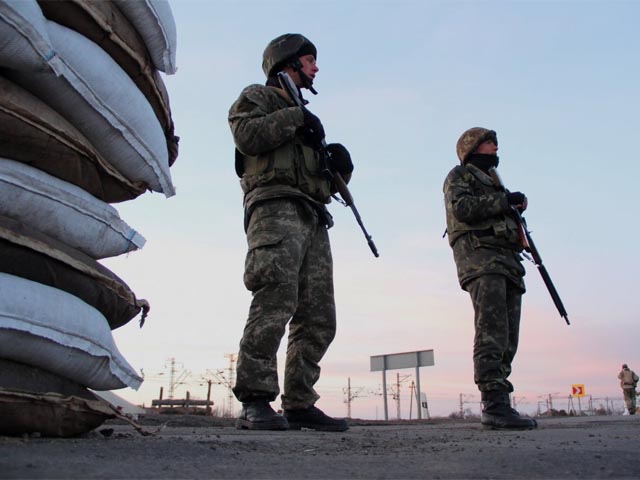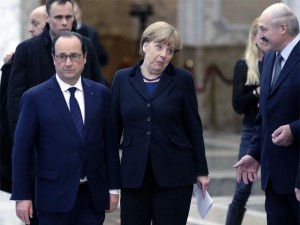Poland and Germany were both initiators and drivers of a New Eastern policy linked to the Eastern neighborhood and Russia/Soviet Union.
Uladzimir Matskevich: Crimean provocation only drew attention to the relocations of Russian troops

Russia has no opportunities, i.e., no intent to unleash a full-scale war against Ukraine; but the destabilization of the situation in the country remains one of its main goals.
In Ukraine, there is no ideological, political or any other national unity. It seems that in Ukraine itself, numerous political forces play into Russia’s hand in achieving this goal. In the future, Russia won’t fail to take advantage of the growing contradictions in society to destabilize the situation in Ukraine.
What stands behind the arrest of “Ukrainian saboteurs” in Crimea?
Philosopher and methodologist Uladzimir Matskevich answered the questions of the EuroBelarus Information Service.
— There is no clarity yet as to what stands behind the capture of “Ukrainian saboteurs” in Crimea and the clamor that followed it, isn’t it?
— No far-reaching political or strategic goals can be traced there. Quasi-saboteur events happened in the situation of increasing military presence in Crimea, which Russia stuffed with troops. Naturally, it was necessary to explain such military activity: both for Russia itself, and for the international community, and the Crimean residents. Provocation was, probably, used to explain the activity of military formations.
— So the talks about another wave of the Russian-Ukrainian conflict are groundless, aren’t they?
— There are all signs that something is being prepared on the borders of Ukraine, Donbas, and Crimea. But now it is very difficult to determine what direction the events will take.
From the very beginning of the Russian-Ukrainian War I have been repeatedly saying that Russia has no opportunities, i.e., no intent to unleash a full-scale war against Ukraine; but the destabilization of the situation in the country remains one of its main goals. Numerous actions of the Russian troops, military formations of DPR and LPR, increasing of military presence in Crimea, and the whole propaganda machine in general are aimed at that. It seems that in Ukraine itself, numerous political forces play into Russia’s hand in achieving this goal.
— Are you talking about political forces that Ukraine inherited as a legacy of Yanukovych?
— They have existed before Yanukovych. Perhaps, they are also somehow connected with Yanukovych and with the political forces that supported him.
But in spite of the impression that Maidan left for the whole world, unity and consolidation of Ukrainian society around Maidan, and then to protect Donbas — this unity is just an impression. In Ukraine, there is no ideological, political or any other national unity. Ukraine has long lived in the naive pluralism: oligarchic clans, who were warring with each other and who had different economic interests and different views on how they would like to see Ukraine have been freely developing in the country. Therefore, Ukrainian politicians and the economic and business elites of Ukraine are very disunited and manage to negotiate and consolidate with great difficulty. This becomes apparent both in Verkhovna Rada as well as at the regional level.
Now a great dissatisfaction of those who took part in the hostilities in Donbas adds up to this; many of them got demobilized, many have resigned but are still keeping their arms. Part of the Ukrainian society that has passed through the war is very explosive: discontent and suspicion are growing in it — both to the authorities and to each other; and there is no doubt that Russia won’t fail to take advantage of this situation in the future. “Divide and rule” principle still operates in Ukraine at its full capacity.
— I.e. Kremlin intends to destabilize situation in Ukraine through Ukrainians themselves, without direct military intervention, doesn’t it?
— Russia's military presence in Ukraine continues, both in the occupied Crimea, and in the occupied territories of Lugansk and Donetsk regions. This factor is still working and Russia will be trying to use disunity and discord in the Ukrainian society in its own interest.
— Or can it be that by raising a storm in a teacup, Russia is trying to divert attention from other, more important events? Concentration of Russian troops on Ukrainian and Belarusan borders is causing the growing concern. Experts are more and more often naming Belarus as the next target of Russian aggression.
— Thoughts on such kind of distraction often come to the heads of analysts and journalists; however, this stereotype doesn’t always work: for example, Crimean provocation has rather drawn attention to the movement of Russian troops and their concentration in different sections of the Russian-Ukrainian and Russian-Belarusan border.
Initially Russia explained the movement of its troops as the response to the actions of NATO troops in the Baltic States and Poland. But NATO doesn’t threaten anyone; relocation of NATO troops poses no threat either from a strategic or a narrow-minded perspective. Thus, Russia’s response looks as excessive, inappropriate, and disproportionate to NATO’s actions. Hence, we need other reasons to explain why Russia is increasing its presence of troops on the borders of Ukraine and Belarus.
Others
-
Uladzimir Matskevich: The sooner the "Union State" is denounced, the better for Belarus
Not only does the “Union State” undermine the establishment of civilized relations with Europe, but it hinders the possibility of normal relations between Belarus and Russia.
-
Uladzimir Matskevich: The regime can no longer control the situation in the country
The authorities are unable to prolong the social contract with the people: there is no way out of the social crisis.
-
Press release of the BNP in connection with the next round of the dialogue in the format of the EU-Belarus Coordination Group
Belarusan National Platform of the Eastern Partnership Civil Society Forum welcomes the dialogue process in the format of the EU-Belarus Coordination Group, the third round of which was held in Minsk on 3-4 April 2017.
-
Hennadiy Maksak: Europe must react adequately to the events in Minsk
A new wave of political repressions should make the EU return to tougher policy towards the Belarusan regime.








Comments
From farewell to a new Eastern policy and towards a new development
Poland and Germany were both initiators and drivers of a New Eastern policy linked to the Eastern neighborhood and Russia/Soviet Union.